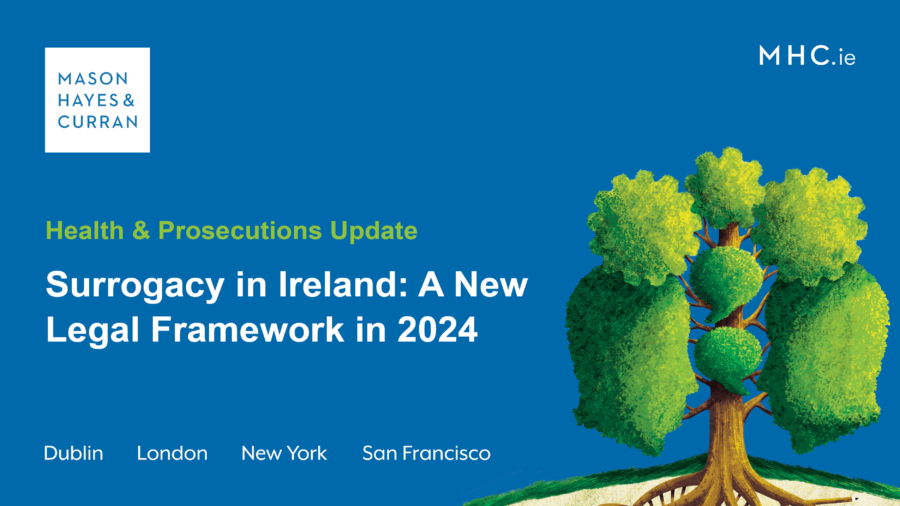
The Irish Government approved the wording of the Health (Assisted Human Reproduction) Bill 2022 in December 2023. It is expected to progress through the next legislative stages in spring 2024. Our Health & Prosecutions team examines what this means for Irish families who have children or are planning to have children through surrogacy.
The long-awaited legislation on assisted reproduction has not yet been finalised. However, there was significant progress in 2023 and the Health (Assisted Human Reproduction) Bill 2022 is currently going through the Oireachtas committee, with further progress expected in spring 2024.
Key changes
Once commenced, it is hoped that the legislation will provide for the following key changes for surrogate families:
- A parental order can be applied for in the Circuit Court to recognise the lawful parentage of a child through surrogacy, once criteria are met
- The parental orders will be available retrospectively to existing surrogate families as well as future surrogate families
- International and domestic surrogacy arrangements will be recognised
- The Assisted Human Reproduction Regulatory Authority (AHRRA) and The National Surrogacy Register will be established
- Intending parents and the surrogate mother will be required to obtain legal advice before signing a surrogacy agreement
- Reasonable costs only to be paid to the surrogate mother
Comment
There is a significant gap in Ireland’s legal framework for those families who have children through surrogacy. One of the most pressing issues is the lack of parental rights for the intended parents who care for the child after birth.
Irrespective of the gender of the couple, only the biological father of the child can apply for guardianship in Ireland immediately after the child is born. The biological mother or any other intended parent can apply for guardianship once they have been caring for a child for two years through the Children and Family Relationships Act 2015. However, it leaves a two-year gap during which time the parents of the child have limited or no parental rights for that child.
The Irish Constitution (Section 42A) reflects that in all cases involving guardianship of children, the best interests of the child shall be the paramount consideration. This is not possible in the absence of a clear legislative framework and it is hoped the new legislation will fill this gap at the earliest opportunity.
For more information on the scope of the law on surrogacy, contact a member of our Health & Prosecutions team.
People also ask
My partner and I would like to have a child through a surrogate in another country – will we be able to make decisions regarding the child’s day-to-day life once we start caring for the child? |
At the moment, only the biological father of the child has an automatic right to apply for guardianship in terms of decision-making / consent for the child. Other parents will have to wait until they are caring for the child for two years before they can apply for guardianship. When the new legislation commences, all parents can apply for a parental order in Court. |
My partner and I have already had a child through surrogacy with a woman outside of Ireland. Will this arrangement be recognised in the new legislation? |
Yes, this can be recognised retrospectively as part of the new legal framework, subject to meeting the criteria for a parental order. |
What supports will be in place for surrogate families under the new legislation? |
A new human reproduction regulatory authority will be established in Ireland. The main aim of the authority will be to promote the health and well-being of children born through surrogacy and other assisted human reproduction. It will have regulatory and advisory functions for surrogates, intended parents and service providers |
The content of this article is provided for information purposes only and does not constitute legal or other advice.
Share this:



